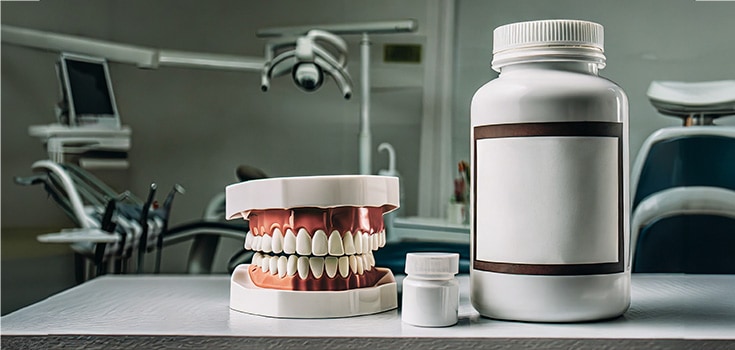Fluoride Supplements – Are they Really Worth Taking?
By Mike Barrett
Updated October 21, 2023

Fluoride is a controversial topic. While some studies draw a link between fluoride and numerous health ailments and others find inconclusive associations, what we have at best is strengthened teeth. So is something like fluoride supplements really worth taking or even fighting for? Are there really not less controversial ways to protect teeth?
As mentioned, fluoride is controversial. It’s added to water supplies around the world in the name of cavity prevention and enhanced tooth health. At the same time, fluoride supplements are being recommended to those who don’t have the “luxury” of a fluoridated water supply.
While there is already a great deal of previous research available showing the ineffectiveness and dangers of fluoride, even more research has surfaced revealing its lack of necessity, with a focus on fluoride supplements.
Comprehensive Review Lists Reasons to Reconsider Fluoride Supplements
One comprehensive review by the IAOMT examined multiple safety concerns around fluoride supplements. While often promoted for dental health, the report argues fluoride’s risks may outweigh any potential benefits from supplementation.
Given that there are clearly better alternatives, let’s start with the arguably most important reasons to reconsider these supplements.
Fluoride Has Been Associated with Numerous Health Risks
The IAOMT report compiles evidence linking fluoride exposure to neurodevelopmental effects. Both animal studies and human research suggest fluoride may impair cognition and neuromuscular control, particularly during early development. This has even been showcased in a study from Harvard finding that fluoride lowers IQ.
The authors conclude fluoride’s developmental neurotoxicity warrants reconsidering supplement use and safety guidelines.
They also make the following points:
- Nutrient Interaction Issues: fluoride may inhibit calcium absorption and bone mineralization, while magnesium deficiency exacerbates fluoride toxicity. The authors argue supplements should be avoided for those with nutritional deficiencies or taking certain prescription medications that interact with fluoride.
- Dosage Issues: The IAOMT report cites studies showing wide variability in individual responses to different fluoride intakes. They argue the “one dose fits all” approach to supplementation fails to account for factors like weight, genetics, nutritional status, and fluoride obtained from other sources. Overdosing can increase the risk of dental and skeletal fluorosis.
(Further down I’ll show you a fluoride supplement chart in case you do decide to go the supplement route.)
Increased Risk of Skeletal Fluorosis
One 2008 review, while concluding that the supplements can be effective for certain teeth, ironically points out a heightened risk of skeletal fluorosis.
“There is weak and inconsistent evidence that the use of fluoride supplements prevents dental caries in primary teeth. There is evidence that such supplements prevent caries in permanent teeth. Mild-to-moderate dental fluorosis is a significant side effect.”
Recommendations Based on Outdated Beliefs
Fluoride supplements, in the form of drops, tablets, and lozenges, were introduced in the 1950s. They were intended as a substitute for fluoridated water for children in areas without fluoridated water.
The use of fluoride supplements was based on two now-outdated beliefs:
- Fluoride needs to be ingested to be effective.
- Children in non-fluoridated areas have a fluoride deficiency.
These supplements require a prescription from a dentist or doctor. Notably, the Food and Drug Administration (FDA) has never approved fluoride supplements as safe and effective, labeling them as “unapproved new drugs.”
Fluoride Supplement Chart
If you do choose to incorporate fluoride supplements for yourself or your child, here’s an official fluoride supplement chart from the American Dental Association.

The ADA also notes to consider all sources of fluoride intake including bottled water, and to consider contacting local, county, and/or state health departments about local water fluoride content or test water samples.
Simple Ways to Protect and Strengthen Your Teeth
Here are some unquestionably effective, inexpensive ways to protect/strengthen teeth and prevent cavities while not at all being controversial like fluoride treatment.
- Regular Brushing: Brushing teeth twice a day with a soft-bristled toothbrush helps remove food particles and plaque from the tooth surfaces.
- Flossing: Daily flossing removes food particles and plaque from between the teeth and under the gum line, where a toothbrush can’t reach.
- Oil Pulling: An ancient Ayurvedic practice, oil pulling involves swishing a tablespoon of oil (usually coconut, sesame, or sunflower oil) in the mouth for about 20 minutes and then spitting it out. It’s believed to pull out toxins, bacteria, and debris from the mouth.
- Baking Soda: Baking soda can be used as a natural toothpaste alternative. Its mild abrasive nature can help remove stains and neutralize acids. However, it’s essential to use it sparingly as excessive use can erode enamel. A mixture of coconut oil and baking soda can serve as a natural toothpaste. The lauric acid in coconut oil has antimicrobial properties, which can help reduce bacteria in the mouth.
- Activated Charcoal: Activated charcoal can help remove surface stains from teeth, making them appear whiter. However, it should be used with caution and not too frequently as it’s abrasive.
- Regular Dental Check-ups: Visiting a dentist regularly for a check-up and professional cleaning is crucial. Dentists can detect early signs of dental problems and provide appropriate treatments.
- Balanced Diet (limit sugar intake): Consuming a balanced diet with limited sugary snacks and beverages can help prevent cavities.
- Drinking Water: Drinking water, especially after meals, can help wash away food particles and neutralize acids produced by bacteria in the mouth.
- Limiting Acidic Drinks: Acidic beverages, like soft drinks, citrus juices, and wine, can erode tooth enamel over time.
